22 Urgent Repairs Bad Landlords Will Refuse to Make
If you’re dealing with a negligent landlord, you’re not alone in your frustration.
While most property owners maintain their rentals properly, some consistently dodge their legal responsibilities to provide safe, habitable living conditions.
You’ll often find yourself battling these landlords over critical repairs that directly impact your family’s health and safety.
From dangerous electrical issues to toxic mold growth, knowing which repairs are legally required—and how to demand action—can mean the difference between living in misery and getting the safe home you deserve.
Let’s explore the most urgent repairs that problematic landlords typically resist making.
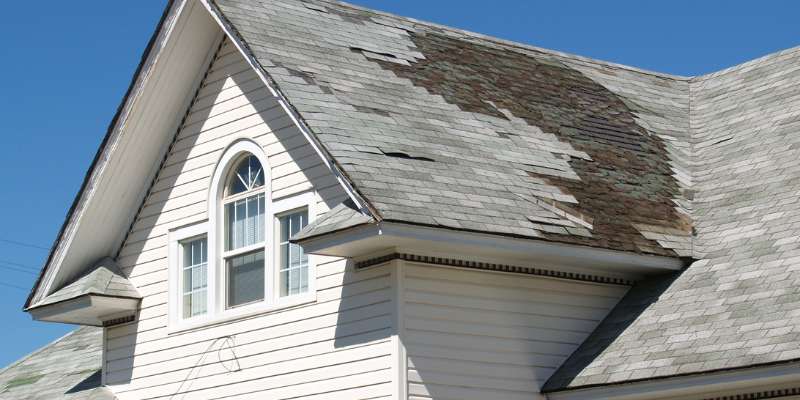
Leaking Roof Repairs
Many landlords consistently dodge their responsibility to repair leaky roofs, despite this being a fundamental habitability issue that affects your right to a weatherproof living space.
When water penetrates your ceiling, it can cause extensive damage to your belongings, create dangerous electrical hazards, and lead to toxic mold growth that threatens your health.
You’ll need to document everything if your landlord won’t fix the leak.
Take photos of water damage, capture video of active leaks, and keep a detailed log of when you’ve reported the issue.
Send written repair requests via certified mail, explicitly stating how the leak impacts your living conditions and safety.
Most states require landlords to maintain weatherproof structures, and a leaking roof directly violates this obligation.
If your landlord still won’t act, you have several legal options: withholding rent (in states where it’s legal), reporting code violations to local housing authorities, or filing a lawsuit for breach of warranty of habitability.
Don’t let your landlord’s negligence compromise your safety – you’re entitled to prompt roof repairs under the law, and you shouldn’t hesitate to exercise your rights to secure them.
Broken Water Heater
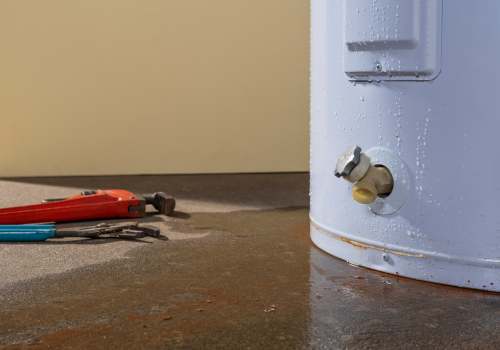
When your water heater stops working, landlords often try to downplay it as a minor inconvenience rather than the essential habitability issue it truly is.
Most state laws classify functioning hot water as a basic requirement for habitable living conditions, and your landlord can’t legally ignore this repair.
You’ll know your water heater’s failing when you experience consistently cold water, strange noises from the unit, rusty water, or leaking around the tank.
Don’t let your landlord convince you to wait it out or use temporary fixes.
Document every communication about the issue and send a formal written repair request immediately.
If your landlord refuses to fix or replace the broken water heater, you have several legal options.
You can report them to your local housing authority, withhold rent (in states where it’s legal), or use “repair and deduct” remedies.
Some jurisdictions allow you to temporarily relocate and bill your landlord for the expenses.
Faulty Electrical Wiring
Inside your rental home, faulty electrical wiring poses one of the most serious safety hazards you’ll encounter.
Warning signs include flickering lights, buzzing outlets, frequently tripped circuit breakers, and warm or discolored wall plates.
If you spot charred outlets or smell burning plastic, evacuate immediately and contact your local fire department.
You have the legal right to demand your landlord address electrical issues promptly.
Document everything by taking photos, sending written repair requests via certified mail, and keeping copies of all correspondence.
Most states require landlords to maintain electrical systems that meet basic safety codes.
If your landlord refuses to fix dangerous wiring, contact your local building inspector or housing authority for an official inspection.
Don’t let your landlord pressure you into accepting unsafe conditions.
You can withhold rent (following your state’s specific procedures), break your lease without penalty, or file a lawsuit if the landlord violates housing codes.
Consider consulting a tenant rights attorney who can protect your interests.
Remember: electrical fires caused by faulty wiring can destroy property and claim lives – you’re entitled to a home with safe, properly functioning electrical systems.
Pest Control Issues
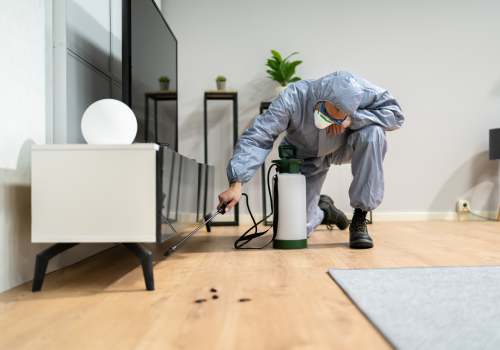
Across rental properties nationwide, pest infestations represent one of the most common maintenance disputes between tenants and landlords.
When you’re dealing with roaches, rodents, bed bugs, or other unwanted creatures, you’ve got legal rights that protect you from living in unsanitary conditions.
Most states require landlords to maintain pest-free living environments, and they can’t simply pass this responsibility onto you through lease clauses.
You’ll need to document the infestation thoroughly – take photos, videos, and keep a detailed log of all sightings.
If you spot even a single rodent or cockroach, report it immediately in writing to your landlord.
If your landlord refuses to address the pest problem, you’ve got options.
You can file a complaint with your local health department, withhold rent (in states where it’s legal), or exercise your right to “repair and deduct.”
Don’t let your landlord convince you that pest control is your responsibility – unless you’ve directly caused the infestation through poor housekeeping, they’re legally obligated to handle and pay for pest elimination services.
Stay firm on your rights and don’t accept temporary fixes or delays.
Mold Remediation
Dangerous mold growth poses three serious health risks for tenants: respiratory issues, allergic reactions, and potential toxic exposure.
When you spot dark patches on walls, ceilings, or around windows, you’re likely dealing with a mold problem that your landlord is legally required to address.
Don’t let your landlord dismiss mold as “just a little dampness.”
You have specific rights under state health codes that require landlords to maintain habitable living conditions.
Document the mold’s location with photos, and send a written notice to your landlord describing the problem.
If they refuse to act, you’ll need this evidence for legal proceedings.
You can strengthen your case by getting an independent mold inspection.
Many landlords will try to avoid professional remediation costs by offering quick fixes like bleach solutions.
Don’t accept these inadequate solutions.
Proper mold remediation requires identifying and fixing the underlying moisture source, removing affected materials, and ensuring proper ventilation.
If your landlord continues to ignore the issue, contact your local health department or housing authority.
You may also have the right to withhold rent or exercise “repair and deduct” remedies, depending on your state’s laws.
Heating System Problems

Much like mold issues threaten your health, malfunctioning heating systems can make your living space uninhabitable, especially during cold months.
You’re legally entitled to a functioning heating system that maintains a minimum temperature (typically 68°F during day, 62°F at night).
If your landlord won’t fix heating problems, you’ve got rights to protect yourself.
Document every issue meticulously. Record room temperatures at different times, take photos of thermometer readings, and keep a log of all communication with your landlord.
If you’re using space heaters as a temporary solution, save those receipts – you might be entitled to reimbursement.
When your heating system fails, immediately notify your landlord in writing. Send it via certified mail and keep copies.
Many states allow you to withhold rent or exercise “repair and deduct” rights if the problem isn’t fixed promptly.
You can also contact your local housing authority or building inspector, who can issue violations and force your landlord to act.
Don’t let your landlord’s negligence put your health at risk.
If they’re refusing repairs, consider consulting a tenant rights attorney or legal aid organization for guidance on your next steps.
Broken Air Conditioning
A malfunctioning air conditioning system can pose serious health risks, especially for elderly tenants, young children, and those with medical conditions.
If your landlord won’t repair your broken AC, you’ll need to understand your rights and take strategic action to protect yourself.
First, check your lease agreement and local laws. Many states don’t require landlords to provide air conditioning unless it’s specifically mentioned in your lease.
However, if your unit came with AC, your landlord must maintain it in working order.
Document everything: take photos, record temperatures, and keep copies of all communication with your landlord.
You can strengthen your case by getting a professional HVAC inspection and obtaining written documentation of any health risks from your doctor.
Send your landlord a formal written request for repairs via certified mail.
If they still won’t fix it, you have several options: file a complaint with your local housing authority, withhold rent (where legally permitted), or pursue legal action.
Consider joining a tenant’s union or consulting with a tenant rights attorney.
Don’t attempt DIY repairs or hire contractors without written permission – this could violate your lease and make you liable for damages.
Plumbing Leaks
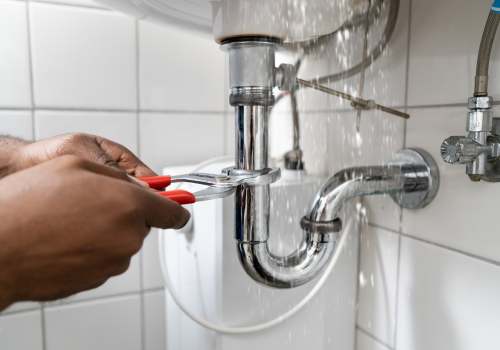
While plumbing leaks might seem minor at first, they can quickly escalate into severe problems that threaten your health and property.
Even small drips can lead to toxic mold growth, structural damage, and skyrocketing water bills that you shouldn’t have to pay for.
Don’t let your landlord dismiss these issues as cosmetic concerns.
You’ve got specific rights when it comes to plumbing problems.
Most state laws require landlords to maintain functional plumbing systems and address leaks promptly.
If you’re facing persistent leaks, document everything.
Take photos, record videos, and keep a detailed log of when you’ve reported issues.
You’ll want to submit all maintenance requests in writing, preferably through certified mail or email, creating a paper trail of your landlord’s negligence.
If your landlord refuses to fix plumbing leaks, you may have the right to repair and deduct the cost from your rent, but you’ll need to follow your state’s specific procedures.
Watch for signs of retaliation – it’s illegal for landlords to raise rent or threaten eviction because you’ve demanded necessary repairs.
Consider contacting your local housing authority or tenant rights organization if the situation persists.
Window and Door Security
Every residential tenant has the fundamental right to secure doors and windows that protect against intruders and weather.
When your landlord fails to repair broken locks, damaged frames, or cracked glass, they’re violating basic habitability laws and compromising your safety.
You shouldn’t have to live with windows that don’t latch or doors that don’t close properly.
Document all security issues immediately. Take photos of broken locks, damaged frames, and any points of unauthorized entry.
Send your landlord a written request for repairs, citing your state’s specific security requirements.
Many states mandate functioning locks on all exterior doors, secure window latches, and proper weatherproofing.
If your landlord doesn’t respond within a reasonable timeframe (usually 14-30 days), you’ve got options.
You can report them to local housing authorities, withhold rent in accordance with state laws, or exercise your right to “repair and deduct.”
Keep all communication records and repair estimates.
Don’t let your landlord dismiss security concerns – broken entry points aren’t just maintenance issues, they’re serious safety violations that could make them liable if you’re harmed as a result of their negligence.
Structural Wall Damage
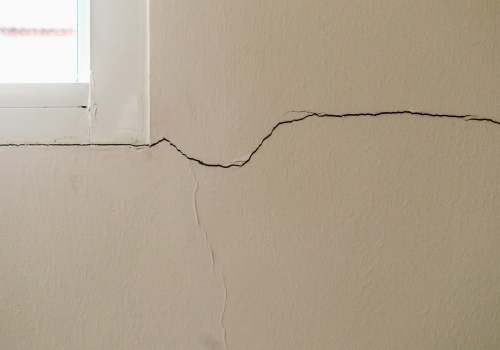
Structural wall damage poses one of the most serious threats to tenant safety and building integrity.
When you notice cracks wider than 1/4 inch, bulging sections, or separation between walls and ceiling, you’re dealing with potentially dangerous conditions that require immediate attention.
Your landlord’s refusal to address these issues isn’t just negligent—it’s often illegal.
You’ll need to document everything. Take dated photos of the damage, measure crack widths, and note any changes over time.
If you spot water stains, mold, or feel drafts near the damaged areas, include these details in your written complaint.
Send your landlord a certified letter demanding repairs, citing your state’s building codes and habitability laws.
Don’t let your landlord dismiss structural issues as “cosmetic.”
If they refuse to act, contact your local building inspector or housing authority. They can issue violation notices and order mandatory repairs.
You may also have the right to withhold rent or exercise “repair and deduct” remedies, but you’ll need to follow your state’s specific legal procedures.
Consider consulting a tenant rights attorney if the situation persists—structural problems can lead to catastrophic failures that put your safety at risk.
Foundation Issues
Should your landlord continue ignoring foundation problems, you may have grounds for legal action or the right to withhold rent (depending on your state’s laws).
Consider consulting a tenant rights attorney, as foundation issues can eventually lead to catastrophic structural failure.
Smoke Detector Maintenance
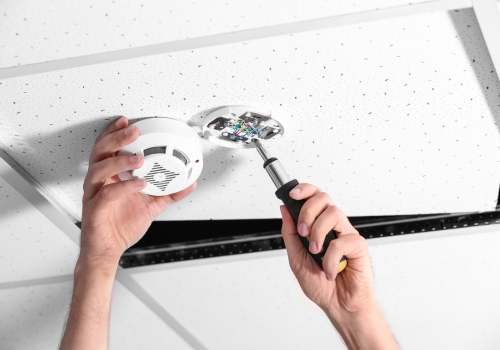
Landlords frequently neglect their legal obligation to maintain working smoke detectors in rental units, putting tenants’ lives at risk.
You’re entitled to functional smoke detectors in every bedroom and common area, with many states requiring interconnected systems that alert the entire property when smoke is detected.
If your landlord won’t respond to smoke detector maintenance requests, you should immediately document the issue with photos and written communication.
You have the right to test your smoke detectors monthly and request battery replacements or unit updates when needed.
Most jurisdictions require landlords to install 10-year sealed battery smoke detectors or hardwired units with battery backup.
Don’t let your landlord’s negligence compromise your safety. If they refuse to maintain smoke detectors, you can report violations to your local fire marshal or housing authority.
You’re legally protected from retaliation when reporting safety violations.
In many states, you can deduct the cost of smoke detector repairs from your rent or purchase and install approved devices yourself, keeping all receipts for reimbursement.
Carbon Monoxide Detector Installation
Like smoke detectors, carbon monoxide detectors serve as a vital line of defense against a deadly threat – but this one’s invisible and odorless.
Carbon monoxide (CO) poisoning kills hundreds of Americans yearly, often while they’re sleeping and completely unaware of the danger.
You have the legal right to functional CO detectors in your rental unit.
Most states require landlords to install and maintain these devices, particularly if your home has fuel-burning appliances, attached garages, or fireplaces.
If your landlord hasn’t installed CO detectors, you’re facing a serious safety violation.
Don’t take no for an answer. Document your requests for CO detector installation in writing, and reference your state’s specific requirements.
If your landlord still refuses, you can:
- Contact your local housing authority or building inspector
- File a formal complaint with your state’s housing department
- Consider withholding rent (check local laws first)
- Install detectors yourself and deduct the cost from rent
Remember: CO detectors should be installed on every level of your home, especially near sleeping areas.
Your life could depend on these devices, so don’t let your landlord’s negligence put you at risk.
Broken Appliances

Most rental agreements spell out your right to working appliances that came with the unit – from refrigerators and ovens to dishwashers and washing machines.
When these appliances break down, your landlord is legally required to repair or replace them within a reasonable timeframe, typically 14-30 days depending on your state’s laws.
Don’t let your landlord claim that appliance repairs aren’t their responsibility.
If the appliance was present when you signed your lease, it’s considered part of your rental agreement.
Document every malfunction by taking photos and videos.
Send written repair requests through certified mail or email, keeping copies for your records.
If your landlord refuses to fix broken appliances, you have several options.
You can file a complaint with your local housing authority, withhold rent (where legally permitted), or exercise your right to “repair and deduct.”
Before taking action, check your state’s specific tenant rights. Many states allow you to hire a repair service and subtract the cost from your next rent payment.
Always provide written notice before pursuing these remedies, and maintain detailed records of all communications and repair costs.
Water Damage
Water damage represents one of the most serious and potentially destructive issues you’ll face as a tenant.
When water infiltrates walls, ceilings, or floors, it can lead to toxic mold growth, structural deterioration, and severe health risks within days.
Your landlord is legally required to address water damage promptly, regardless of its source.
Don’t let your landlord dismiss signs like water stains, bubbling paint, warped flooring, or musty odors.
You’ll need to document everything: Take dated photos, send written notices via certified mail, and keep copies of all communications.
If the damage stems from plumbing issues, roof leaks, or foundation problems, your landlord must fix these underlying causes.
Your state’s health codes likely mandate specific timeframes for water damage repairs.
If your landlord fails to respond, you’ve got options:
Contact your local housing authority, withhold rent (where legally permitted), or exercise your right to “repair and deduct.”
In severe cases, you may qualify for immediate lease termination under the “constructive eviction” doctrine.
Broken Stairs and Railings
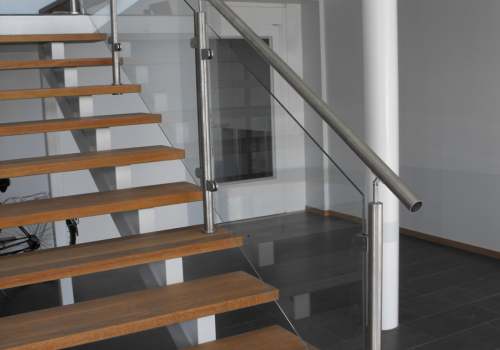
Faulty stairs and loose railings pose three immediate safety hazards that your landlord can’t legally ignore.
First, damaged steps create a serious fall risk, especially for elderly tenants, children, and anyone carrying items.
Second, unstable railings won’t provide the required support during a slip or stumble.
Third, rotting wood or corroded metal can suddenly give way, leading to catastrophic injuries.
You’ve got significant legal protection when it comes to stair and railing repairs.
Building codes require landlords to maintain these structural elements in safe, working condition.
If your landlord won’t fix broken stairs or railings, document everything.
Take photos, send written repair requests, and keep copies of all communications.
Note any wobbling, splintering, or missing pieces.
Don’t let your landlord claim these are cosmetic issues.
State laws typically classify stair and railing repairs as essential maintenance affecting habitability and safety.
You can report violations to your local housing authority or building inspector.
If you’re injured due to neglected stairs or railings, you’ll likely have grounds for legal action against your landlord, including potential compensation for medical expenses and lost wages.
Clogged Gutters
Along your roof’s edge, clogged gutters create serious structural threats that landlords often dismiss as minor maintenance issues.
When your landlord neglects gutter maintenance, you’ll face potential water damage to your home’s foundation, walls, and roof structure.
Backed-up gutters can lead to ice dams in winter, causing shingle damage and dangerous icicles that threaten your safety.
You’re entitled to proper water drainage through functioning gutters. If your landlord won’t address clogged gutters, document everything.
Take photos of overflowing gutters during rainfall, capture videos of water cascading down exterior walls, and photograph any interior water damage.
Keep records of all maintenance requests and your landlord’s responses.
Most states require landlords to maintain proper drainage systems as part of their duty to provide a habitable dwelling.
If your landlord refuses to clear the gutters, you can file a complaint with your local housing authority.
Consider consulting a tenant rights attorney, especially if you’ve experienced property damage or health issues from mold growth caused by water infiltration.
Don’t let your landlord’s negligence compromise your home’s structural integrity or your family’s safety.
Bathroom Ventilation Problems
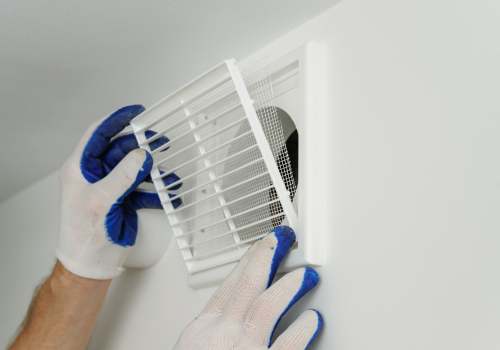
Poor ventilation in bathrooms creates a breeding ground for mold, mildew, and respiratory hazards that negligent landlords often dismiss.
You’ll notice the signs: persistent dampness, peeling paint, black spots on walls or ceilings, and a musty odor that won’t dissipate.
These conditions aren’t just unsightly – they’re violations of habitable housing standards in most jurisdictions.
If your bathroom lacks proper ventilation, whether it’s a malfunctioning exhaust fan or a window that won’t open, you’re entitled to repairs under most state laws.
Document everything: take photos of visible mold, keep records of respiratory issues, and maintain copies of all communications with your landlord.
You can strengthen your case by obtaining an indoor air quality test or having a certified inspector document the ventilation deficiencies.
Should your landlord refuse to address the problem, you’ve got options.
Contact your local housing authority or health department, as they can issue violation notices.
Consider withholding rent (where legally permitted) or exercising “repair and deduct” remedies.
If conditions become severe, you might’ve grounds for breaking your lease without penalty under the “constructive eviction” doctrine.
Lead Paint Removal
Inside older buildings, lead paint poses a serious health hazard that many landlords try to dodge addressing, despite clear legal requirements.
If your home was built before 1978, there’s a high probability that lead paint lurks beneath newer paint layers, particularly around windows, doors, and other high-friction areas.
You’ve got legal rights when it comes to lead paint. Your landlord can’t simply paint over it – that’s not a proper solution.
Federal law requires landlords to disclose known lead paint hazards before leasing, and many states mandate testing and professional removal when lead paint is discovered.
If you’ve got children under six, you’re entitled to even stronger protections.
Don’t let your landlord dismiss your concerns about peeling or chipping paint. Document everything with photos and written complaints.
If they refuse to act, contact your local health department or housing authority immediately.
You can also request a lead inspection from a certified professional. Remember, lead poisoning isn’t just theoretical – it causes permanent brain damage, especially in children.
If your landlord retaliates against you for reporting lead paint issues, that’s illegal, and you’ve got grounds for legal action.
Asbestos Abatement
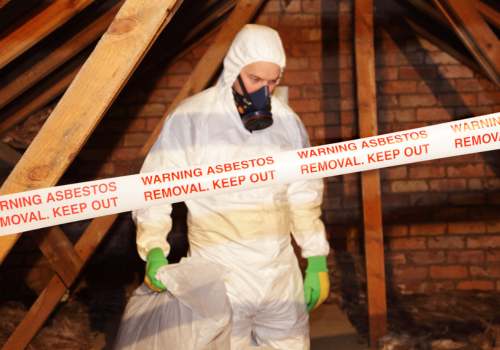
Much like lead paint, asbestos lurks in countless older buildings, particularly in insulation, floor tiles, and ceiling materials manufactured before the 1980s.
You’ll often discover it during renovations or when materials begin to deteriorate, releasing dangerous fibers into the air.
If you suspect asbestos in your rental unit, you’ve got the right to demand proper abatement.
Your landlord can’t legally ignore asbestos concerns, as federal law requires professional handling of this hazardous material.
If you spot damaged surfaces, crumbling ceiling tiles, or exposed insulation in an older building, document everything with photos and written descriptions.
Don’t attempt to remove or disturb suspected asbestos materials yourself – this could create a serious health hazard.
When your landlord refuses to address asbestos concerns, contact your local health department or building inspector immediately.
You’ll want to request an official inspection and get test results in writing.
Many states allow you to withhold rent or break your lease if your landlord fails to address this serious health hazard.
Keep all communications with your landlord in writing, and consider consulting a tenant rights attorney if the situation escalates.
Faulty Gas Lines
Leaking or damaged gas lines represent one of the most dangerous repair issues you’ll face as a tenant, requiring immediate action due to the risk of explosion, fire, and carbon monoxide poisoning.
If you smell gas or suspect a leak, evacuate immediately and call your gas company from a safe location. Don’t wait for landlord approval in this emergency situation.
Your landlord must maintain safe gas lines under habitability laws. If they refuse repairs, document everything:
Take photos of faulty connections, record dates of complaints, and keep copies of all communications.
Contact your local building inspector or fire marshal, who can issue violation notices and force repairs.
You’ve got legal options if your landlord still won’t act. Many states allow you to withhold rent or use “repair and deduct” remedies for severe safety violations.
You can also file an emergency court order requiring immediate repairs. Don’t let your landlord’s negligence put your life at risk – gas line repairs aren’t negotiable.
Consider contacting a tenant rights attorney who can help enforce your right to a safe living environment.
Fire Safety Violations
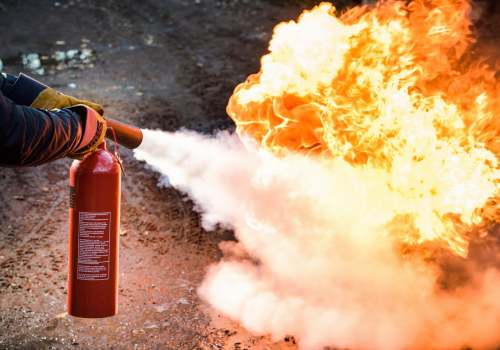
Safety violations involving fire hazards pose grave risks that negligent landlords often downplay or ignore.
You’ll need to watch for missing or broken smoke detectors, blocked fire escapes, improperly stored flammable materials, and faulty electrical systems.
If your landlord won’t address these issues, you’re legally entitled to take action.
Document every fire safety violation you find. Take photos of exposed wiring, missing fire extinguishers, or corridors blocked with debris.
You’ve got the right to demand functioning smoke detectors in bedrooms and common areas – it’s the law in most states.
Keep copies of all written requests for repairs and your landlord’s responses.
If your landlord won’t comply, contact your local fire marshal or building inspector. They’ll conduct an official inspection and can issue citations forcing your landlord to act.
You can also withhold rent in many jurisdictions until fire safety violations are fixed, but you’ll need to follow specific legal procedures.
Don’t let your landlord’s negligence put your life at risk.
Fire safety violations aren’t just inconveniences – they’re serious legal infractions that can have deadly consequences.
FAQs
Can Tenants Legally Withhold Rent During Prolonged Repair Disputes With Landlords?
You can legally withhold rent in many states, but you must follow strict procedures: document everything, notify your landlord in writing, and place rent in escrow. Consult tenant rights organizations before taking this step.
What Documentation Should Renters Collect Before Filing a Housing Code Complaint?
A picture’s worth a thousand words! Document everything with photos, written repair requests, text messages, emails, and certified letters to your landlord. Keep dated records of all communication and get witnesses’ statements when possible.
How Long Can Landlords Legally Delay Emergency Repairs Before Facing Penalties?
You’ll typically have 24-72 hours for landlords to address true emergencies like no heat, water, or major leaks. If they don’t respond, you’re legally entitled to file complaints and seek immediate enforcement through housing authorities.
Are Property Managers Liable if Landlords Refuse to Address Urgent Repairs?
Yes, you can hold property managers liable alongside landlords for failing to address urgent repairs. They’re acting as the landlord’s agent and share responsibility under most state laws for maintaining habitable conditions.
Can Renters Hire Contractors Directly and Deduct Costs From Monthly Rent?
In 43 states, you’ve got “repair and deduct” rights. You can hire contractors for urgent repairs if your landlord won’t respond, but you’ll need to follow strict procedures and keep detailed documentation to protect yourself.
Final Thoughts
You’re facing an unimaginable battle when your landlord refuses these critical repairs.
Don’t let them gamble with your safety – document everything obsessively, from that dangerously sparking outlet to toxic black mold.
If they’re ignoring your rights, you’ve got powerful legal options: withhold rent (legally), file complaints with housing authorities, or pursue legal action.
Your safety isn’t negotiable, and the law’s on your side.